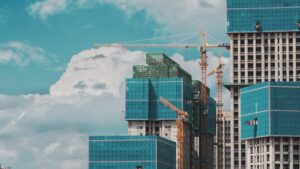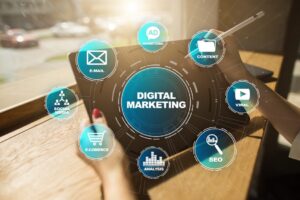We sat down with Lorri Rowlandson of BGIS to discuss the role sensor technology and technical innovation plays within the modern workplace. Our talk covered the historic reaction to change, understanding value, and the challenges facing the industry in a post-covid world.
Can you tell us a little bit about yourself and your career today, please?
Sure – my current role is Senior Vice President of Strategy and Innovation at a company called BGIS. We’re a small global boutique facilities management company of just under nine thousand employees globally. We operate primarily in Canada, the US, Australia, New Zealand, and the UK and our core business is facilities management.
I guess my current role is the in-house mad scientist [laughs]. I’m the sponsor of innovation and I help cultivate value for our clients through our dedicated program of innovation. My career path has not been a straight line a lot of the time and I’ve had to reinvent myself through education or just take an opportunity based on what presented itself in the moment. I started out as a sourcing specialist with IBM and then I worked on large outsourcing arrangements. Then I bloomed into other areas like sustainability, workplace technologies and strategy, employee experience, and the rest.
This year’s theme is ‘Urban Supersensing’. Given the increasing overlap between the modern built environment and digital technologies, does sensor tech and digital innovation play a part in your daily work?
Absolutely. Technology drives efficiencies. It gives greater experience, greater convenience, and better data-driven decisions. It’s helping us get over subjectivity with objectivity and manages emotionally charged discussions with facts. Technology empowers the building with automated activities that flex and evolve based on the changing needs of occupants. I think we’re going to see technology adding sophistication to those bigger ecosystems outside of the building as well as within the building.
Do you feel that understanding that interplay is important?
I think that there’s a perception that it’s an “all or nothing” game. This is not the first time in our history where technology has slingshot us into major improvements. The kind of discussion we’re having around ideas like artificial intelligence and the resistance that surround those concepts is the same as when we as humans discussed the invention the car and when they were worried that industrialization was going to put blacksmiths out of business. Of course, one hundred years ago the industrialized world was quite different, and it’s really not been very long that we’ve been working in a more modern technology-driven society. I think we’re just faced with another point in our evolution as we have faced in the past; but I do think this particular evolution is creating stress due to the shorter time frame. We will experience more change in the next 10 years than we have in the last 50 years. But I also think it’s an incredible opportunity for people to reskill and use technology to take ourselves to different heights. We can get more sophisticated in the kinds of things that we’re using human capital for and leverage those things that are uniquely ‘human’ that any machine could never recreate, like creativity, imagination, and problem-solving. So, I think we’re just going through growing pains.
Are these ‘pains’ something you encounter in your daily practice when it comes to embedding innovation?
I would say that there is sort of a blanket resistance to artificial intelligence and robotics and the perceived threat that they will take jobs away from people. I look at that from the perspective of how they could enable humans to be better or complement their work. Of course, let’s not be glib. There are definitely instances where we are going to have to retrain individuals and help find other purposes for them. But I think that should be our focus instead of actively resisting progress. Because if you look at what’s happening in the world for geographies that are refusing to engage or are getting too mired in red tape or overthinking certain aspects, you’re seeing other countries just shooting forward with their own progress. We need to find a way forward, or else be faced with being left behind.
Where do you see innovation taking us in the next decade or so? Are there key drivers and technologies that you can see potentially impacting or influencing our sector?
There are major disruptive innovations emerging that are going to change everything; if I have to pick my ‘favorites’ that are going to have the most impact, sooner than later, would be the Metaverse and 3D printing. I think the innovation with the most material impact will be the ‘metaverse’, which is essentially is augmented and virtual reality. I think just the amount of efficiency and the incredible experiences people can have, and how exhilarating it is with innovations like real-time translations which would have a massive impact on retail and client engagement. The second disruptive technology that’s going to be truly transformative is around additive manufacturing and 3D printing.
We’ve dealt with recent supply chain woes that are very much a physical problem as we saw during the pandemic. I think that was a wake-up call and we’re going to see a lot of focus on additive manufacturing as a way of drive efficiency, remove waste, benefits to the circular economy and sustainability, and alleviating some of the more traditional supply chain limitations. Of course, that might not sound like it pervades directly into tech or real estate or facilities management, but it does. The metaverse will drive very engaging and interactive virtual workplaces, far more exciting and productive than the limitations of a physical workplace. And remember, Covid lockdowns proved that work is what you do, not where you are. 3D printing is already starting to change the construction industry. If you don’t think these technologies are relevant for you, you need to look at not only how it affects your industry, but how it affects your clients’ industries as well to really understand the true impact on your business.
Would you say that a lack of holistic perspective is an issue?
I definitely think it’s a big challenge for a several industries; some are going to get proverbial whiplash, and some won’t make it. It’s really going to impact real estate and the brokerage world. Let’s be honest, these professions are still very much anchored in traditional approaches and are ripe for disruption. Trends like ‘space as a service’, fintech solutions and artificial intelligence, work from anywhere is going to create a lot of pressure on traditional work habits and services within the next five years – we are already seeing these trends creeping in, and they will accelerate quickly. I think it’s the fast-paced timing that will also make it a bumpy ride – big companies are going to have to transform their core business and operating practices at a pace never experienced before.
Do you feel covid impacted this?
Definitely. I really do feel the pandemic has accelerated the adoption of some of those disruptive technologies – even slightly ahead of their time as well as other concepts that are affecting real estate like wellness, and well-being, and health, and safety considerations. It’s a lesson that we can never lose sight of the human element with this technology. I love human beings. And when they’re faced with adversity, their persistence is amazing, and we solve what seems like insurmountable challenges and we rally together against a common foe and purpose. I think that creates a lot of sharing and more information to support a return to work. I mean, we keep hearing ‘the death of the office’ which is a pretty melodramatic statement [laughs]. I don’t think that will ever happen. But I do see a reduction in office space and embracing a much more dispersed concept of ‘workplace’ and the idea of the head office. Basically – it’s that work is what you do. Not where you are. So, if you want employees in the office more, the gauntlet has been thrown down for the office environment – offices are now competing to be the coolest, most productive place an employee would ever want to work, and I’m not sure that’s consistently true today. Offices are competing with convenience and personal views of productivity. And overlayed with a war on talent, this gives employees the power to choose where and how they want to work, whether traditional (get back in the office) kind of companies want to believe it or not. Top talent will express their opinions in turnover rates.
Do you think digital innovation can help with this onboarding, or smoothing the ‘on-ramp’ back to the office?
Absolutely. But I would just remind us that technology is an enabler, not the finish line. The surrounding processes and communications are just as important as the enabling technologies. Technology is tools and should be enabling some kind of outcome or experience or information. So it’s vital we don’t forget about the people process as well. We can talk about digital solutions and technologies we want to use in spaces, but it has to be tempered by a conversation about how teams can draw the most benefit from them. At BGIS we have an expression called practical innovation that we like to use, and that focuses on the real-world impacts and benefits of implementation. So, I think technologies around utilization are very, very useful. And that helps us with not only planning janitorial services and right-sizing certain services and providing information in a transparent way to the occupants. In practical terms, that’s reservation systems and adding augmented capabilities that can be run in support of covid program and allow for a return to working in a phased manner. Of course, with the data and analytics so that it becomes a really strong space planning and combines occupancy reporting along with that. Then it’s also important to keep focus on employees and I think we’re really underutilizing survey tools. We need a much more grassroots approach when it comes to understanding what our employees want, trusting that they will ask for what will make them the most productive, and then holding them accountable to outcomes not by butts in seats in the office. So just really changing that way that we incentivize and manage performance and enabling the productivity of our employees by using technologies as well.
Lorri, thanks so much for your time. Before we go, could I ask for a taster of what you’re going to cover in WDBE 2021?
I’m going to try to keep it practical and relevant for what people are thinking about right now. I’m going to give a current pulse on the hybrid office, best practices, things that you need to be successful. Lessons learned and included in that will be some essential technologies. I’m going to talk I’m going to push people a little bit further just so they’re taking a bit more of a three-year view. We’ve got the essentials of to allow us to survive in the moment. Moving past that in a post-covid working world is vital for us all.
Lorri Rowlandson will be speaking at WDBE 2021 on September 28, 2021. You can book tickets from here or learn more about the other events and the regularly updated agenda.




Responses